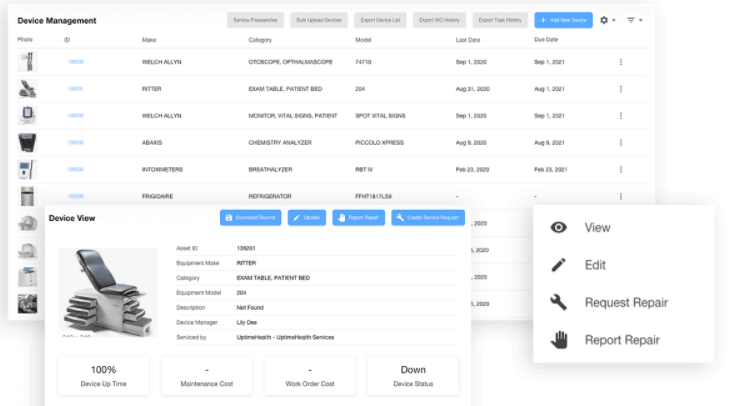UptimeHealth & Newfire: Medical Device Platform Succeeds with Tech Partnership

We sat down with Bill Olsen, CTO of UptimeHealth, and multi-time client of Newfire. He previously worked as CTO of Liaison International, where he utilized Newfire to add velocity, engineering craftsmanship, and product & software development. Bill was so pleased with the work he saw from our team, he decided to employ Newfire to build some of his first products with UptimeHealth.

Tell me about yourself and your company.
Bill: My name is Bill Olsen, and I’m the co-founder and CTO of Uptime Health. We’re based in Charlestown, Massachusetts. We have about 20 people now, and we’ve been around for a couple of years. We’re in the healthcare space.
What does your company do?
Bill: We provide a solution that allows companies to manage their equipment and processes. Excluding large hospitals, we work with basically any health clinic where they’ve got complex medical equipment, but don’t have their own clinical engineering team to manage all the processes [e.g. warranties, contracts, compliance and maintenance].
How did your past roles lead you to your current position?
Bill: This is my first co-founder role. Before Uptime Health, I worked at many big companies. I started off at General Electric and worked on their process manufacturing. Although I wasn’t a co-founder, I was an original founding member of Iron Mountain Digital Archives, about 20 years ago. My name is actually on the patent for that software. Later, I worked for RSA, working on replatforming their software.
After RSA, I worked for a company called Accruent, which sold software solutions to hospitals. During my time there, I heard a lot of our customers ask for a marketplace – a place to source additional technicians beyond their own team. We looked to find a company that we could partner with, or even buy, and we just couldn’t find anybody.
So it was clear to me that nobody was doing this, yet there was a clear market demand. I noticed there was a lot of demand from smaller clinics, especially since the fastest growing part of healthcare is urgent care. So there was an unaddressed need there. I, along with the Newfire team, specifically designed this product for that marketplace.

How is Uptime Health perceived by its customers?
Bill: We are seen as providing a solution that meets our customers’ needs. We’re hyper-focused on customer satisfaction, and I think customers see us as an organization that they can count on to get something done. When I talk about what we’re going to be delivering a quarter or two or three quarters from now, I think their confidence level is fairly high that we’re going to be able to accomplish it.
Currently, what are your biggest challenges?
Bill: Integration is going to be a key challenge. When you start working with technician organizations, you find out that even if they love your software, they’re not ready to use it yet. Retraining hundreds of technicians on our software is time consuming. Our goal is that they can get their data to flow into our software and move over to our system. Our work order system was designed with a business process engine (BPM) integrated into it, and it handles all the integrations and business processing. So we can do all these integrations very easily from a technology perspective.
We’re really good at managing agile product development, but managing projects with customers that tie into software development is a different piece. To handle this challenge, we just hired a new Scrum master/project manager at Newfire.
How do you evaluate a technology partner?
Bill: Look, I’ve bought so many IT packages in the past that I know the advertising doesn’t always meet what’s going to be delivered. So when it comes to a service partnership, what I look for is somebody that I can trust, that I can work with, that when things don’t work out, we can collaborate in a way to make it right.
I’m really old school. If we want to hire somebody with front-end experience, we’ll hire someone with JavaScript experience. However, I don’t really care if they don’t have 5 years of React – they can learn React if they already know JavaScript. I just really want a good engineer, with great communication skills, and an excellent cultural fit.
What are your organizational priorities for 2022?
Bill: As the software becomes more popular on the technician side, the less sexy part of what we need to do is the administrative part. We need to put more self-service features into the product as we grow our customer base from thousands of customers, to tens of thousands of customers. We won’t be able to get on phone calls for all of them. They need to be able to check and uncheck and add features. We don’t have a lot of that right now. So when I look at 2022, it’s going to be building administrative features that make the software easier to scale for customers.
How does your organization use data?
Bill: For us, data is one of the most important things. We’re the only company that is a multi-tenet product that has an entry point for both technicians and facility users to collaborate and share data. Other companies have single tenets, so they can’t look across different industries and geographies.
For us, building, having the flywheel work, and having an ecosystem where we can get data in and then share that data is key. Over time, our data is going to be such that we can offer predictive analysis. If we can provide facility users information about the status of their equipment based on industry trends, then they can make informed decisions on buying equipment, and can save a lot of money.
And I think the same thing is true on the technician’s side. For example, if you’re a technician organization and you are thinking about going into the mid-Atlantic region, what if something in our software package could tell you, “here are all the potential customers in the mid-Atlantic region that have Siemens equipment that need service in the next two years?” How much would you pay to find these potential customers? We’ll have all that data as this ecosystem continues to work.
What tech trend do you predict in the next five years?
Bill: I think security is going to be a big thing in healthcare. There’s not a really good unified solution for security. A lot of this equipment that we’re working on right now can be very easily internet enabled, so the device can tell us when it needs maintenance. However, nobody wants to turn on the internet part of their device because they’re all afraid of being hacked. So I think this industry needs some type of unified security solution that will allow hospitals and urgent care centers to feel comfortable putting their equipment online. I think a solution for this is going to be a real game changer.
Why do you think Newfire is different?
Bill: We’re proud to be a partner with Newfire. This is my second time working with Newfire, the first was back in 2016 when Newfire was just starting out. One of the reasons why I went with Newfire was primarily because of the founders, Steve and Jaya. They were in Cambridge, and I lived in Cambridge, and I liked what they were doing. I trusted them and I figured if anything went sideways, I could just go down the street and talk to Jaya, and he’d help me fix it. And to be honest with you, I still feel that way.
Trust is the biggest part of this. It sounds like a simple tenet, but you’d be surprised how many companies out there don’t provide that. Even though Newfire is a bigger company now, I still feel like it’s a relationship where not only are you able to deliver, but if something does go wrong, I can trust you to work with us through the issue.
